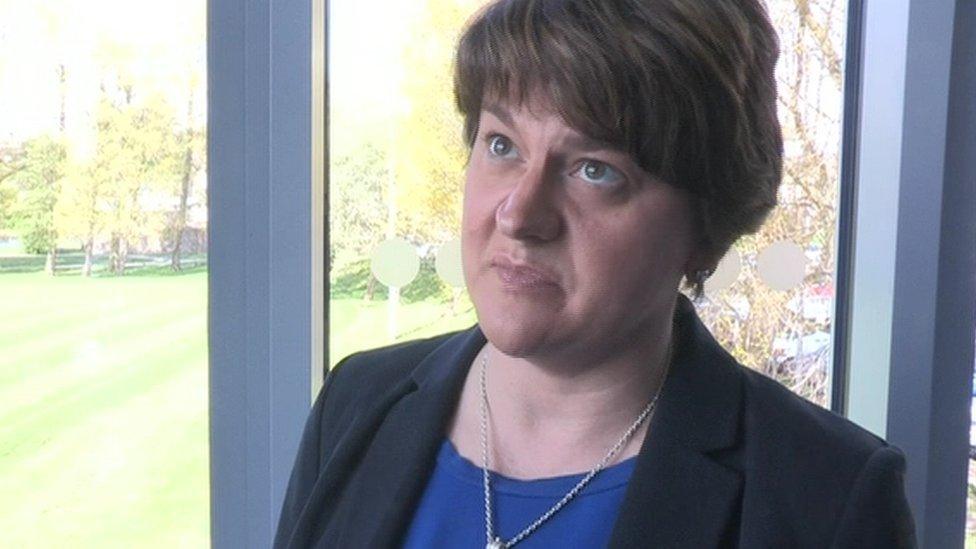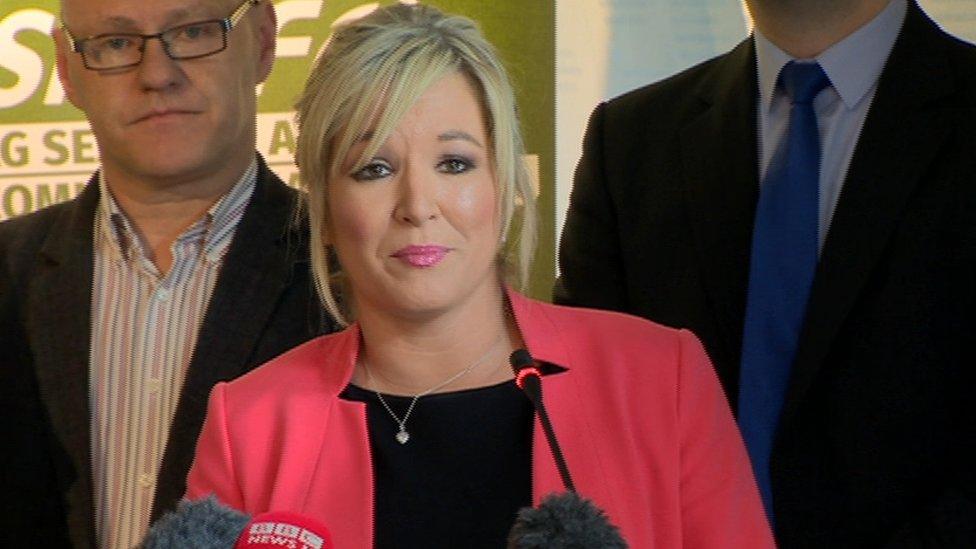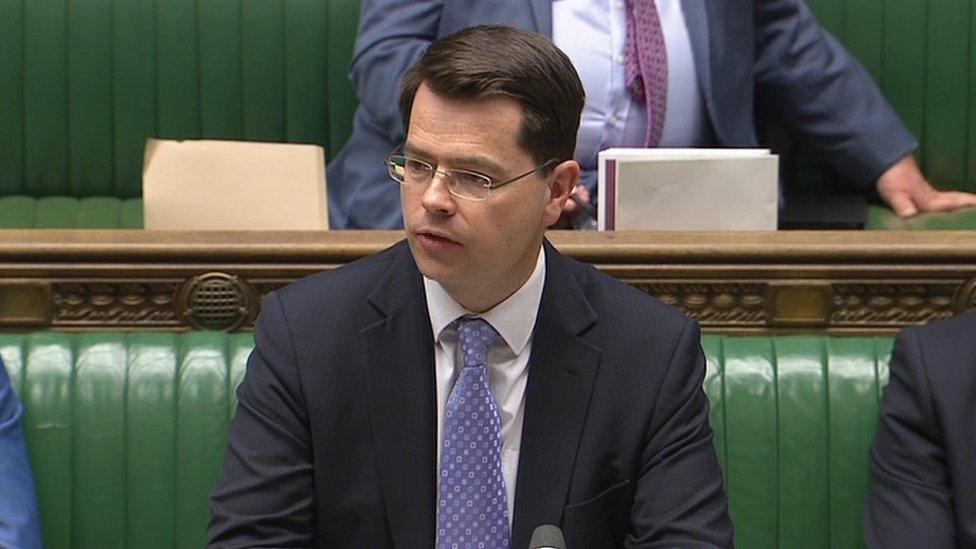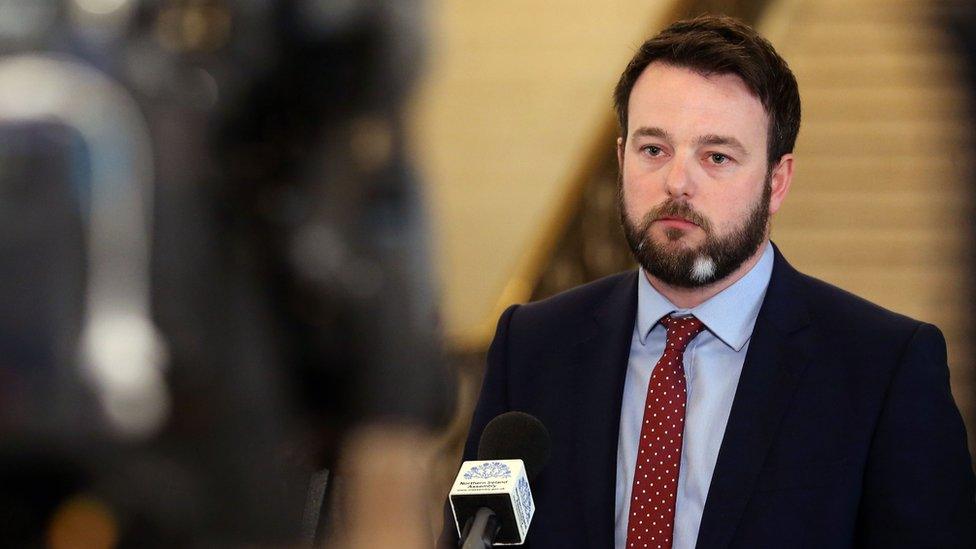DUP and Sinn Féin clash over budget cut blame
- Published

Arlene Foster said Sinn Féin were to blame for proposed spending cuts
The DUP and Sinn Féin are at odds over who is to blame for proposed public spending cuts in Northern Ireland.
Secretary of State James Brokenshire has published indicative figures for a budget he will impose if parties do not reach a power-sharing deal.
The figures include a 2.5% cut to the education budget - a loss of £50m.
However Stormont's Department of Finance says the cut will be closer to £20m when adjusted for the impact of civil service redundancy payments.
'Fiddling while Rome burns'
Teachers have warned that jobs could be lost as a result of the cuts, with one principal describing them as "completely savage".
Another principal told BBC News NI the political parties were "fiddling while Rome burns".
DUP leader Arlene Foster blamed Sinn Féin and said the party "would rather stick to what seems to be a growing political wish list instead of dealing with the real issues that matter".
However, Sinn Féin's northern leader Michelle O'Neill said "Tory cuts" were to blame and that "difficult decisions" would be required in the future.
Stormont's two largest parties, the DUP and Sinn Féin, have been unable to reach agreement to share power since a snap Northern Ireland Assembly election on 2 March.
Northern Ireland has been without a devolved government since January, when the coalition collapsed over a botched energy scheme.
Since the start of the financial year, Northern Ireland's finances have been controlled by a senior civil servant because the previous executive did not produce a budget.

Michelle O'Neill said the budget was because of "Tory cuts" and not down to the talks process
Mr Brokenshire said the proposed budget figures were to "give clarity" in the absence of an executive.
The proposed cut to the education budget has been heavily criticised by some teachers who said it will result in job losses, while the Northern Ireland committee of the Irish Congress of Trade Unions (ICTU) said it would "not accept the back-of-an-envelope figures".
Mrs Foster said the DUP would have "much preferred to have been setting our own budget".
"Our position has always been that we want to see an executive formed as quickly after the election as possible.
"Unfortunately, others don't take that view and we're now in a situation where direct rule ministers are having to set the budget for Northern Ireland and I think that's a real shame and a real pity."

James Brokenshire said the proposed budget was to give clarity to Stormont departments in the absence of an executive
However, Sinn Féin's northern leader Michelle O'Neill said that "Tory cuts didn't just happen because there's a talks process or that the talks process hasn't succeeded yet".
"The Tory cuts have been in place since 2010 whenever they came into power.
"So there's been difficult decisions for ministers to take and let's be very assured, there's big, difficult decisions to come in the future because the Tory government has set their mind against attacking public services, the health services, education - right across the board."
Steve Aiken, the Ulster Unionist finance spokesman, accused Sinn Féin of "hypocrisy" for criticising the cuts and said the budget was similar to one that would have been introduced by former finance minister Máirtín Ó Muilleoir.
He added that Sinn Féin "appear to only want to keep taking the electorate for fools" and accused the party of "saying they'd stop Tory cuts at the same time they were willingly implementing them in their respective executive departments".
In order to keep day-to-day services running in the absence of locally elected ministers, the Westminster government published emergency legislation last week - known as the Ministerial Appointments and Regional Rates Bill, external.
The bill began its accelerated passage through Westminster on Monday.
- Published25 April 2017

- Published25 April 2017

- Published24 April 2017
